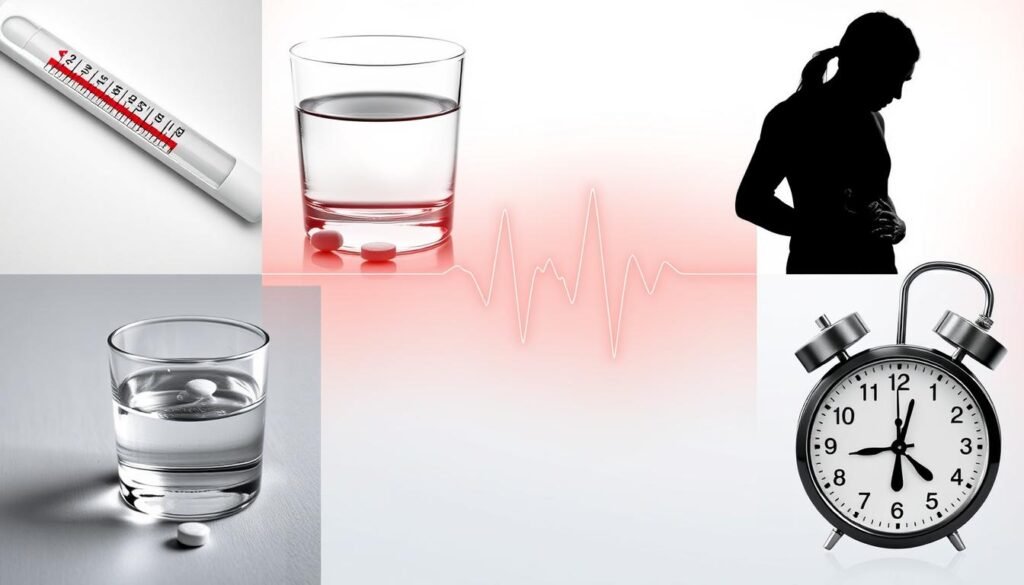Did you know a brochure by the Alzheimer Society of Canada highlights 10 warning signs of dementia? These early signs can greatly affect daily life. It’s crucial to recognize them before getting a formal diagnosis. Understanding these signs early can lead to timely medical help and better health outcomes.
Being aware of health signs is key, as they can vary from small memory lapses to big mood swings. Each sign shows there might be deeper issues that need attention. By learning about these symptoms early and getting medical advice quickly, we can take better care of our health.
Key Takeaways
- 10 warning signs of dementia can indicate the need for early medical attention.
- Recognizing subtle changes in memory and mood can lead to timely intervention.
- Early diagnosis improves planning and care options for individuals with dementia.
- Consulting healthcare providers promptly enhances chances for better outcomes.
- Awareness of health indicators empowers individuals to take charge of their health.
Understanding Symptoms vs. Signs
Knowing the difference between signs and symptoms is key in managing health. Seeing warning signs early can help a lot with treatment. Signs are things others can see, like a rash. Symptoms are what you feel, like pain. Knowing both helps you keep an eye on your health.
Definition of Signs and Symptoms
Doctors see signs during exams, like unusual heart beats. Symptoms are what you tell them, like feeling tired. It’s crucial to tell these apart to know what health issues need focus. Signs versus symptoms are both vital in checking your health.
Importance of Recognizing Changes in Your Body
Being alert to your body’s changes is important. It helps you catch health issues early. For example, knowing the difference between normal and worrisome symptoms can prevent big health problems. Doctors categorize symptoms to better manage them. Even if you feel fine, some hidden conditions could be dangerous. So, it’s wise to regularly check your health.
| Type | Description | Examples |
|---|---|---|
| Signs | Observable indications detected by healthcare professionals. | Rash, elevated temperature, abnormal heartbeat |
| Symptoms | Subjective experiences reported by individuals. | Pain, fatigue, dizziness |
| Asymptomatic | Conditions where no symptoms are present despite potential health issues. | Early-stage prostate cancer, HPV |
Common Warning Signs Before Diagnosis
Identifying common warning signs is key to protecting your health. Early signs can vary from physical to emotional changes. Recognizing these early can lead to quick medical help, which is crucial.
Recognizing Early Signs of Illness
It’s important to be aware of early illness signs. Here are some key warning signs:
- Persistent pain: If you feel unexplained pain that doesn’t go away, see a doctor.
- Chronic cough: A cough that lasts more than two weeks could be serious.
- Difficulty swallowing: This could mean a serious issue like cancer.
- Postmenopausal bleeding: This could be a sign of cervical or endometrial cancer.
- Frequent fevers or infections: This could point to an immune system problem.
- Unexplained weight loss: Losing weight suddenly without trying can be a warning sign.
Red Flags of Health Issues
Paying attention to health red flags is crucial. Look out for these signs:
- Changes in bowel habits: Consistent troubles could suggest a serious issue.
- Oral changes: Sores in your mouth might be warning signs.
- Continuous headache: If headaches don’t stop, you might need a doctor.
- Acetone breath odor: This could be a sign of a serious health issue.
- Bloating: Constant bloating should not be ignored.

Physical Symptoms to Watch Out For
It’s key to know the physical symptoms that signal health problems. Spotting warning signs early can point to major health issues. By keeping an eye on these signs, you can get medical help quickly.
Chest Pain and Its Implications
Chest pain can mean serious heart problems. If you have chest pain with shortness of breath, see a doctor right away. Knowing the type of pain is vital to figure out if it’s heart-related or not. Watching for these signs can help you manage your health better.
Abdominal Pain as a Signal for Concern
Lasting stomach pain might mean stomach issues or other serious problems. This pain could be due to digestion issues or internal concerns. Be aware of other symptoms like changes in bathroom habits. Noticing these signs early lets you take action on health problems fast.
Unexplained Weight Changes
If you lose a lot of weight without trying, it could be serious. This weight loss might point to diabetes, cancer, or an overactive thyroid. Talking to a doctor if you see such changes is crucial. Using resources to understand these warning signs is very helpful.
Mental Health Indicators
It’s crucial to know the signs of mental health issues. Spotting these early can lead people to get help sooner. This may stop bigger problems later on. Often, these signs are hard to notice until they really start to impact daily activities.
Excessive Worrying or Fear
Feeling overly worried is a big red flag. Many people find themselves overly anxious about everyday tasks or situations. This constant fear can mess with your sleep, make you tired, and hard to focus. If you’re always worried, it might mean there’s a deeper problem that needs looking into.
Significant Mood Changes
Huge changes in mood could be a sign of mental health struggles. Someone might feel really down for a long time. Or, they might go through extreme ups and downs, feeling very angry or very happy. These swings can hurt relationships and how well someone functions daily.
Signs of Underlying Conditions
Knowing the signs of deeper issues is key in mental health. These signs can be confusion, or trouble concentrating or learning. If you see these along with other signs, it might mean there’s a big mental health challenge. Getting checked by a mental health professional early can help manage these signs.

Specific Red Flags to Recognize
It’s important to know specific red flags for quick medical checks. These signs could show serious health issues that need fast action. Watching for certain symptoms early can mean better chances of recovery.
Intense Headaches and Their Causes
Severe headaches can be a warning of major health problems, like migraines or blood flow issues. If you’re getting these headaches, keep track of how often, how long they last, and other symptoms you have. Knowing these details helps find important red flags for doctors to explore.
Sudden Confusion or Change in Mental Status
Sudden confusion is a major warning sign. It may mean there are problems with the brain or other serious health concerns. This symptom can come on quickly, so being aware is key. Recognizing it early can lead to quick medical help.
Swelling in Legs Without Injury
Leg swelling without any injury could point to heart troubles. It might show there are blood clots or heart failure starting. Knowing this sign and getting it checked out fast can help catch serious issues early.
Importance of Early Detection
Spotting health issues early can make a big difference in treatment and getting better. Early detection helps people get the right help in time. Knowing the early signs means individuals can seek advice early. This often leads to better handling of health issues.
Detect Health Problems Early for Better Outcomes
Screening is vital for cancers like cervical, colorectal, and breast cancers. These make up 28% of cancers in the WHO European Region. Early detection programs aim to catch diseases early to improve survival chances. Having easy and affordable tests helps people act fast on symptoms. This boosts their chances of good health results.
Consequences of Ignoring Warning Signs
Not noticing or ignoring early signs can have serious effects. Waiting too long might lead to diseases being caught too late. This can require tougher treatments and reduce life quality. Not enough awareness and knowledge can delay getting help. It’s crucial to teach the importance of early detection to lower these dangers.

| Health Issue | Early Detection Benefits | Consequences of Ignorance |
|---|---|---|
| Cervical Cancer | Increased survival rates with regular screenings | Late-stage diagnosis can lead to extensive treatments |
| Colorectal Cancer | Early removal of polyps prevents full-blown cancer | Metastasis possible with delayed diagnosis |
| Alzheimer’s Disease | Access to early intervention programs improves quality of life | Declining mental health and quality of life in undiagnosed cases |
Teaching people and doctors to notice early signs is crucial. It opens the door to timely and effective care, leading to better health for everyone.
Warning Signs Before Diagnosis
Knowing warning signs early is key for timely health action. Look out for chronic fatigue and bowel changes. These could point to serious health problems.
Chronic Fatigue: When is it Concerning?
Chronic fatigue means feeling tired all the time, even after rest. This isn’t just about being sleepy. It’s a deep tiredness that hurts your daily life. If it keeps up, it might show problems like sleep issues or autoimmune diseases. Catching this early helps you get the right help sooner.
Changes in Bowel Movements
Don’t ignore changes in your bowel habits. This includes changes in how often you go, stool consistency, or color. It could mean something minor or serious, like irritable bowel syndrome or even colon cancer. Watching for these signs is part of catching illnesses early.
Knowing possible symptoms helps in keeping an eye on your health. Watching for chronic fatigue and bowel changes is vital. Getting help early can make a big difference in your health journey.
For more on spotting mental health red flags and getting help early, check out Psychiatry.org.
When to Seek Immediate Medical Attention
Knowing when to get urgent medical help is key in avoiding serious health issues. Some life-threatening symptoms need quick action for a good outcome. This knowledge helps you make fast, informed choices for your health.
Life-Threatening Symptoms to Watch For
Being aware of symptoms that signal a medical crisis is critical. Adults should look out for these warning signs:
- Chest pain or discomfort lasting for two minutes or more.
- Sudden dizziness, weakness, or changes in vision.
- Severe abdominal pain or pressure.
- Sudden, severe pain anywhere in the body.
- Inability to speak or communicate clearly.
- Coughing up or vomiting blood.
- Unstoppable bleeding or increased sleepiness, especially in children.
If you notice any of these life-threatening symptoms, call 911 or your local emergency number right away. For kids, watch for confusion or irritability, and get them to emergency care quickly.
Consulting Your Doctor Promptly
In less urgent situations, like eating changes or sleepiness in kids, talk to your doctor soon. Knowing where your doctor works helps you get care faster when needed. Learn where the closest hospital is and keep emergency numbers handy. Being ready to act fast in emergencies is vital.
| Symptom | Recommended Action |
|---|---|
| Chest Pain | Call 911 |
| Difficulty Breathing | Seek Immediate Help |
| Severe Abdominal Pain | Consult Emergency Services |
| Sudden Confusion | Consult Your Doctor |
| Coughing Up Blood | Seek Immediate Medical Attention |
Being aware of life-threatening symptoms and the need to consult your doctor fast can save lives. Always act quickly when you see these alarming signs to protect your health.
Listening to Your Body
Listening to your body helps keep you healthy and alerts you to changes that need a doctor’s look. It’s vital to trust your gut, especially with odd symptoms or feeling very tired. Noticing what your body and emotions tell you can help you stay healthy.
Trusting Your Instincts About Your Health
Everyone can sense if they are well or not. This means noticing if you’re hurting or feeling sad. Pain might just be from overdoing it, or it could be something serious. Checking in with yourself helps you know when it’s time to see a doctor.
Writing in a journal every day can help track your health. Note what you eat, your sleep, and how you feel. This can show when things aren’t right. Listening to what your instincts say can make sure you get help when you need it.
The Role of Routine Check-Ups
Regular doctor visits are key for staying healthy. They can catch problems early, which is crucial for good health. For example, starting colon cancer screening at 50 is advised by the CDC. Knowing about these things helps you work better with your doctor.
Check-ups also look at mental health, important since mental issues can affect your body. Getting help when needed is good for all of you. This full care keeps you alert to your health. To learn more about when to see a doctor, click here.
Building a Support System for Awareness
Creating a network for mental health support is crucial for raising awareness. This network can change how one copes with stress and difficult moments. Talking effectively with family and friends creates a safe space for health conversations.
By having open talks, people gain a better understanding of their mental health. This empowers them to seek help when needed.
The Importance of Communication with Family and Friends
Talking openly allows people to share their feelings without fear. Discussing mental health reduces the stigma around it. It’s also vital to have educational resources for meaningful talks.
This strengthens relationships making support systems work better.
Resources for Mental Health Support
Finding the right mental health resources is key for those in need. Groups, helplines, and places like SAMHSA offer help on talking about mental health. Knowing about these resources can prompt action.
For example, checking this guide offers conversation tools. It shows how to support each other effectively.
Conclusion
Recognizing warning signs before diagnosis is key in managing health early. This helps people get timely care, leading to better health outcomes. Studies on symptoms of cancers like lung cancer show the dangers of ignoring these signs. A small number only noticed symptoms related to their disease.
This highlights the critical need for better health awareness. It could lead to faster diagnoses and treatments. Knowing what to look for can save lives.
Good health begins with being aware of changes in your body. Talking to doctors about any concerns is essential. This is vital because reasons behind cancer can include how we live or our environment.
Noticing things like a continuing cough or losing weight unexpectedly is important. These signs could point to serious health issues. So, acting fast can prevent severe delays in getting help.
Building a community that values health awareness makes a big difference. It’s based on supporting each other and sharing what we know. Together, we can encourage everyone to watch for illness signs and see a doctor without delaying.